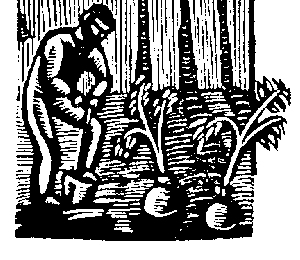Is Your Soil Healthy?By Michelle Andrews When was the last time you took a good look at your soil? Perhaps it needs better drainage, water retention, or more nutrients for plants. Healthy soil is so important, that Ecology is working on a campaign to raise awareness statewide about the benefits of healthy soil as part of the Beyond Waste Plan ( http://www.ecy.wa.gov/beyondwaste ). Compost A primary way to improve soil is by incorporating compost into it. By doing so, you may reap the many benefits of compost. Compost provides available nutrients for plants, improves soil structure, and helps reduce soil erosion. Good soil structure allows the air and water to transport nutrients to plants. Making compost in the backyard can be simple (if you are not in a rush), or it can be more involved if you want compost in 4-6 weeks. To learn details on how to make compost and how to build or buy compost bins, contact your local WSU Extension office or your county or city public works department, or see the list of resources at the end of this article. By composting yard debris and food scraps, you can reduce your garbage by 30 percent or more (Washington State Waste Audit, 2003). Micro-organisms and insects, most of which cannot be seen without a high power microscope, help recycle this material into a useable product - compost. These critters decompose and convert organic material into nutrients that plants can absorb. In just one gram or .21 teaspoon of active compost, there are over 1,000,000,000,000,000,000 (one billion) organisms hard at work! Also, consider composting food scraps at work. Start out by setting up a worm bin and use the finished product (castings) to naturally fertilize the soil. Department of Ecology is composting food scraps at most of its offices throughout the state. At the Lacey Ecology building, 12.5 tons of food scraps and paper towels were composted in 2007 alone. This compost goes back to Ecology staff who use it to improve their soil. Use this guide found on Ecology's Website to help you decide if composting at work is right for you: Managing Food Scraps at Institutions and Agencies--A Guide for Washington State. http://www.ecy.wa.gov/biblio/0607033.html Buying Compost You can purchase compost by the bag or in bulk. Bagged compost is available at most home improvement stores and at plant nurseries. For bulk compost, check the yellow pages under "compost", "bark" or "top soil". Before you buy compost, read the labels and/or ask questions. It's a good idea to know where your compost came from and which materials (grass, leaves, manure, food scraps, etc.) went into it. No two composts are the same, so you may want to try several types to see which one works best for you. Using Compost Healthy plants come from healthy soil, "feed the soil - feed the plant". Mixing compost into existing soil will build a foundation that encourages improved plant health. And the better the plants health, the more resistant they are to pest, disease and drought damage. This decreases the need for fertilizer and pesticide, or eliminates these chemicals all together. Compost amended soil also holds moisture and decreases the amount of water needed for plants during hot weather. Also for soils with poor drainage, adding compost increases porosity and improves the flow of water. Seven ways to improve your soil:
|

